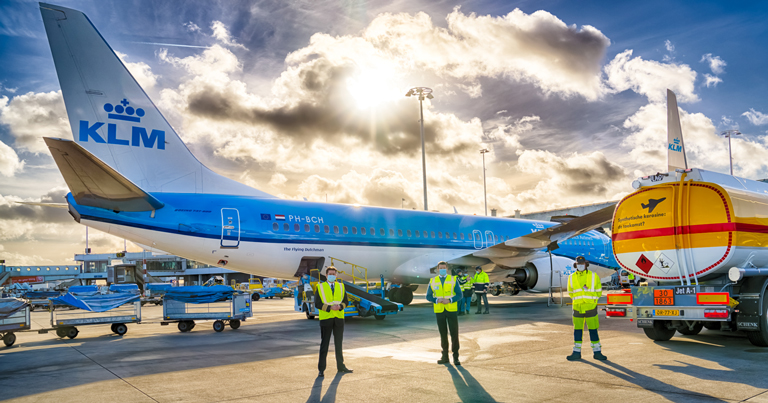
KLM has become the first airline in the world to perform a passenger flight using sustainably produced synthetic kerosene. The flight from Amsterdam Airport Schiphol to Madrid, which took place in January, was carried out on an admixture of 500 litres of sustainable synthetic kerosene.
The synthetic kerosene was produced by Shell in its research centre in Amsterdam based on CO2, water and renewable energy from sun and wind from Dutch soil.
Pieter Elbers, CEO KLM, said: “I am proud that KLM is today operating the industry first flight using synthetic kerosene made from renewable sources. The transition from fossil fuel to sustainable alternatives is one of the largest challenges in aviation. Fleet renewal contributed significantly to the reduction of CO2 emissions, but the upscaling of production and the use of sustainable aviation fuel will make the biggest difference for the current generation of aircraft. That is why we teamed up with various partners some time ago, to stimulate the development of sustainable synthetic kerosene. This first flight on synthetic kerosene shows that it is possible in practice and that we can move forward.”
A number of other initiatives were announced during this week’s international conference on synthetic sustainable aviation fuels (SAF) taking place in The Hague, including a partnership between Schiphol, KLM, Port of Amsterdam, SkyNRG and startup company Synkero on the realisation of a commercial synthetic sustainable kerosene factory in the Amsterdam port. The project seeks to link with sustainable initiatives in the North Sea Canal area, such as the establishment of a 100-megawatt hydrogen plant where up to 15,000 tonnes of green hydrogen can be produced with sustainable electricity.
Another initiative that was highlighted during the event is the construction of a demonstration factory for sustainable kerosene using captured CO2 from the air as a raw material in Rotterdam. The Zenid initiative, in which Uniper, Rotterdam The Hague Airport, Climeworks, SkyNRG and Rotterdam The Hague Innovation Airport are participating, uses a combination of innovative technologies to focus on CO2-neutral aviation with sustainable synthetic kerosene.







